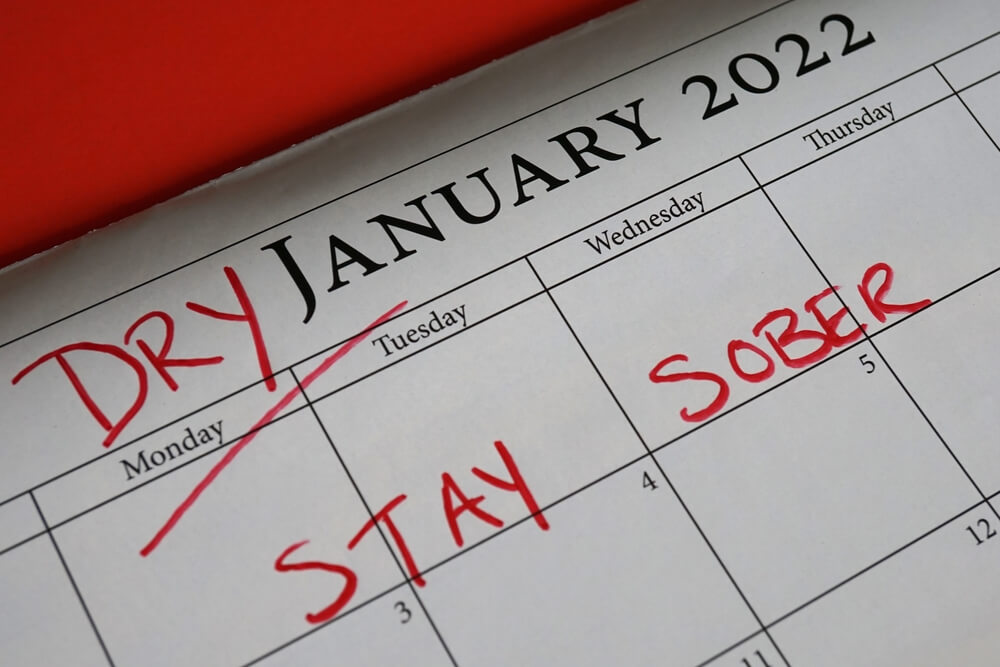Don’t Wait Until Dry January to Quit Drinking

What Is Dry January?
Dry January began as a public health initiative from Alcohol Change UK in 2012. This initiative allows people to reduce their alcohol intake or simply start the new year with a clean slate by choosing not to drink beer, wine, or spirits. Today, millions of people across the globe participate in this health challenge.
Studies show that eliminating alcohol can make a noticeable difference in your overall health. In fact, regular drinkers who quit drinking alcohol for 30 days slept better, had more energy, lost weight, and lowered their blood pressure and cholesterol levels. If you or a loved one struggles with an addiction to alcohol, consider participating in dry January as the first step to sober living.
It may seem impossible to participate in dry January if you suffer from alcohol abuse. Use these tips for a successful dry January:
- Find a substitute non-alcoholic drink, such as sparkling water, soda, or virgin beverages
- Avoid temptations out of your house and bring non-alcoholic drinks when you go to someone else’s house
- Create a support group to let your friends and family know you’re participating in a dry January
- Use an app to help you keep track of your drinking, set personal goals, and receive motivational messages
- Don’t give up
It may seem like drinking alcohol gives you a mood boost or reduces anxiety. However, that’s not always the case. In fact, these are some things that can happen to your health from heavy drinking:
- Alcoholic hepatitis
- Anxiety
- Arrhythmia
- Cancer
- Cirrhosis
- Dementia
- Depression
- Digestive issues
- Fibrosis
- Hearing loss
- High blood pressure
- Pancreatitis
- Sexually transmitted infection
- Stroke
6 Reasons Not To Wait Until January to Stop Drinking
While dry January provides a great excuse for people to stop drinking for a month, there’s truly no wrong time to stop drinking alcohol. If you or a loved one struggles with alcohol abuse or addiction, quitting alcohol sooner can be beneficial. Here are a few perks of not waiting until dry January to stop drinking.
No. 1: Healthier skin
Have you ever heard the term “alcoholic face”? This phrase describes the negative effects that excessive alcohol drinking has on the skin, including:
- Broken capillaries
- Dry skin because of dehydration
- Inflammation
- Jaundice
- Reduced collagen levels lead to loose, saggy skin
- Psoriasis
- Without alcohol, your body restores elasticity to the skin and reduces redness and yellowing around the eyes.
No. 2: Improved sleep
Studies show that poor sleep and alcohol consumption are closely linked. Research shows that alcohol interferes with the sleep-wake cycle, making it more difficult for people under the influence to fall and stay asleep. Plus, alcohol relaxes the muscles in the throat, which can cause sleep apnea and snoring.
No. 3: Weight loss
Since alcohol is filled with sugar and empty calories, it can quickly make you gain weight. Without it, your body adjusts and produces the essential nutrients it needs.
No. 4: Enhanced mental health
Studies show excessive drinking is linked to mental illnesses like anxiety, depression, bipolar disorder, and schizophrenia. According to the National Survey and Drug Use and Health, 9.2 million American adults experienced both a mental illness and a substance use disorder, also known as co-occurring disorders. Without alcohol in your life, you can focus on your mental health and well-being.
No. 5: Stronger immunity
Drinking too much alcohol can interfere with the immune system, preventing it from producing white blood cells to fight against germs and bacteria. Because of this, people who drink alcohol excessively struggle with serious health consequences like pneumonia and tuberculosis. When you give up drinking alcohol, you also get rid of colds, flu bugs, and other illnesses.
No. 6: Lower risk of cancer
Research shows that alcohol is a carcinogen and according to the Centers for Disease Control and Prevention (CDC), the more alcohol you drink, the greater your risk of developing cancers like:
- Breast cancer
- Colon and rectal cancer
- Esophageal cancer
- Laryngeal cancer
- Liver cancer
- Oral cancer
- Throat cancer
There’s no wrong time to start sober living, so why wait until dry January? Start reaping the benefits immediately and cut alcohol out of your life.
Learn why alcohol makes people angry here:
Steps You Can Take Now to Stop Drinking
Don’t wait until dry January to get sober. Instead, start now. While cutting alcohol out of your life may be difficult, it is possible. Use these steps to make sobriety a reality:
- Consider the health effects of alcohol
- Calculate how much alcohol you drink in a day
- Think about why you drink alcohol
- Identify any alcohol triggers
- Include your loved ones, so you have additional support
- Attend group sessions, such as Alcoholics Anonymous (AA)
- Dispose of any alcohol you have and remove alcohol from your home
- Find a new favorite, non-alcoholic drink
- Vary your routine to keep busy
- Make time for self-care
- Rediscover hobbies you enjoy
- Keep a journal and track your progress
- Know why you want to stop drinking
- Reach out for support
Quitting alcohol is a lifestyle change. If you struggle with alcohol abuse, you may need additional help from an addiction treatment center.
 Do You Need Addiction Treatment for Alcoholism?
Do You Need Addiction Treatment for Alcoholism?
According to the National Institute on Alcohol Abuse and Alcoholism, alcohol-related problems are one of the most significant public health issues in the U.S. Many Americans will struggle with controlling their drinking at some point in their lives. In fact, more than 14 million adults aged 18 and older report having an alcohol use disorder (AUD) and one in 10 children live in a home with an alcoholic parent.
Signs and symptoms of alcoholism may include:
- Poor coordination
- Slurred speech
- Impaired thinking
- Memory impairment
- Wanting to stop drinking but not being able to
- Poor performance at work or school
- Being secretive about drinking
- Engaging in risky behavior, such as drinking and driving
- Being in denial about alcohol use
Consider seeking medical attention from an addiction treatment facility to help with alcoholism. Here, you’ll receive several different types of treatment to help you adjust to your new life. In treatment, you can participate in:
- Behavioral treatments
- Medication
- Mutual-support groups
Studies show that approximately one-third of people treated for alcohol abuse have no further symptoms one year after getting sober.
Alcohol Addiction Treatment at WhiteSands
If you want help recovering from alcoholism, seek addiction help from WhiteSands Alcohol and Drug Rehab. Named Florida’s best rehab center in 2020, this treatment facility offers a range of treatments to help patients recover from their addiction. For example, you can engage in various therapy treatments like dialectical behavioral therapy (DBT), cognitive behavioral therapy (CBT), trauma-informed therapy, individual therapy, group therapy, and life skills program.
WhiteSands Alcohol and Drug Rehab isn’t your average treatment center. Here, patients can enjoy an on-site recreation center where patients can play cards, board games, ping pong, and foosball or watch their favorite movie on the theater-sized screen. At WhiteSands Alcohol and Drug Rehab, you feel the comforts of home while receiving extensive addiction treatment to help you on your road to recovery.
If you or a loved one needs help with abuse and/or treatment, please call the WhiteSands Treatment at (877) 855-3470. Our addiction specialists can assess your recovery needs and help you get the addiction treatment that provides the best chance for your long-term recovery.
